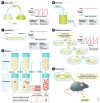Microbial Experimental Evolution - a proving ground for evolutionary theory and a tool for discovery
- PMID: 31338963
- PMCID: PMC6680118
- DOI: 10.15252/embr.201846992
Microbial Experimental Evolution - a proving ground for evolutionary theory and a tool for discovery
Abstract
Microbial experimental evolution uses controlled laboratory populations to study the mechanisms of evolution. The molecular analysis of evolved populations enables empirical tests that can confirm the predictions of evolutionary theory, but can also lead to surprising discoveries. As with other fields in the life sciences, microbial experimental evolution has become a tool, deployed as part of the suite of techniques available to the molecular biologist. Here, I provide a review of the general findings of microbial experimental evolution, especially those relevant to molecular microbiologists that are new to the field. I also relate these results to design considerations for an evolution experiment and suggest future directions for those working at the intersection of experimental evolution and molecular biology.
Keywords: adaptation; directed evolution; experimental evolution; microbiome evolution; selection.
© 2019 The Author. Published under the terms of the CC BY 4.0 license.
Conflict of interest statement
The author declares that he has no conflict of interest.
Figures



References
-
- Garland T, Rose MR (2009) Experimental evolution: concepts, methods, and applications of selection experiments. Berkeley and Los Angeles, CA: University of California Press;
-
- Kassen R (2014) Experimental evolution and the nature of biodiversity. Greenwood Village, CO: Roberts and Company;
-
- Lenski RE, Rose MR, Simpson SC, Tadler SC (1991) Long‐term experimental evolution in Escherichia‐coli. I. Adaptation and divergence during 2,000 generations. Am Nat 138: 1315–1341
-
- Wiser MJ, Ribeck N, Lenski RE (2013) Long‐term dynamics of adaptation in asexual populations. Science 342: 1364–1367 - PubMed
Publication types
MeSH terms
Grants and funding
LinkOut - more resources
Full Text Sources
Research Materials

